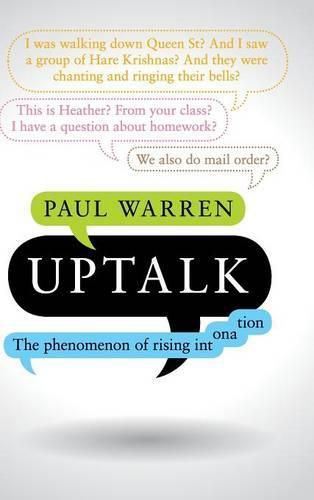Readings Newsletter
Become a Readings Member to make your shopping experience even easier.
Sign in or sign up for free!
You’re not far away from qualifying for FREE standard shipping within Australia
You’ve qualified for FREE standard shipping within Australia
The cart is loading…






‘Uptalk’ is commonly used to refer to rising intonation at the end of declarative sentences, or (to put it more simply) the tendency for people to make statements that sound like questions, a phenomenon that has received wide exposure and commentary in the media. How and where did it originate? Who are the most frequent ‘uptalkers’? How much does it vary according to the speaker’s age, gender and regional dialect? Is it found in other languages as well as English? These and other questions are the subject of this fascinating book. The first comprehensive analysis of ‘uptalk’, it examines its historical origins, geographical spread and social influences. Paul Warren also looks at the media’s coverage of the phenomenon, including the tension between the public’s perception and the views of experts. Uptalk will be welcomed by those working in linguistics, as well as anyone interested in the way we talk today.
$9.00 standard shipping within Australia
FREE standard shipping within Australia for orders over $100.00
Express & International shipping calculated at checkout
‘Uptalk’ is commonly used to refer to rising intonation at the end of declarative sentences, or (to put it more simply) the tendency for people to make statements that sound like questions, a phenomenon that has received wide exposure and commentary in the media. How and where did it originate? Who are the most frequent ‘uptalkers’? How much does it vary according to the speaker’s age, gender and regional dialect? Is it found in other languages as well as English? These and other questions are the subject of this fascinating book. The first comprehensive analysis of ‘uptalk’, it examines its historical origins, geographical spread and social influences. Paul Warren also looks at the media’s coverage of the phenomenon, including the tension between the public’s perception and the views of experts. Uptalk will be welcomed by those working in linguistics, as well as anyone interested in the way we talk today.